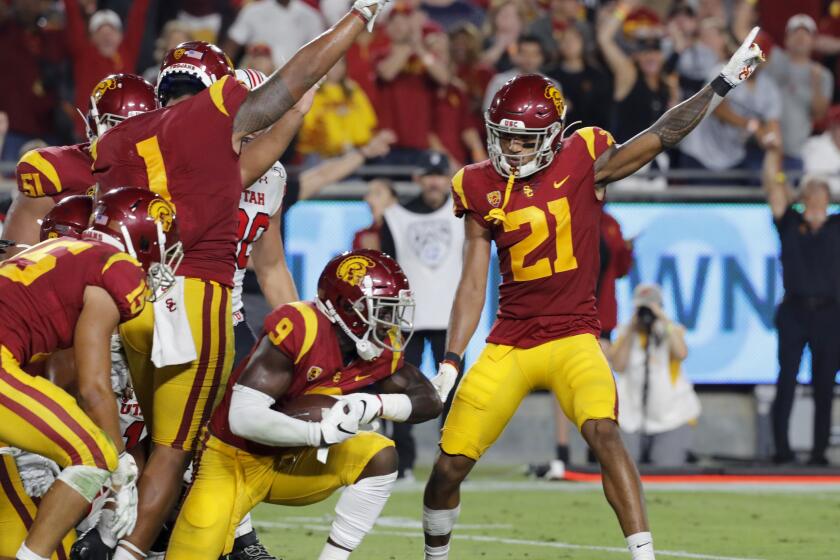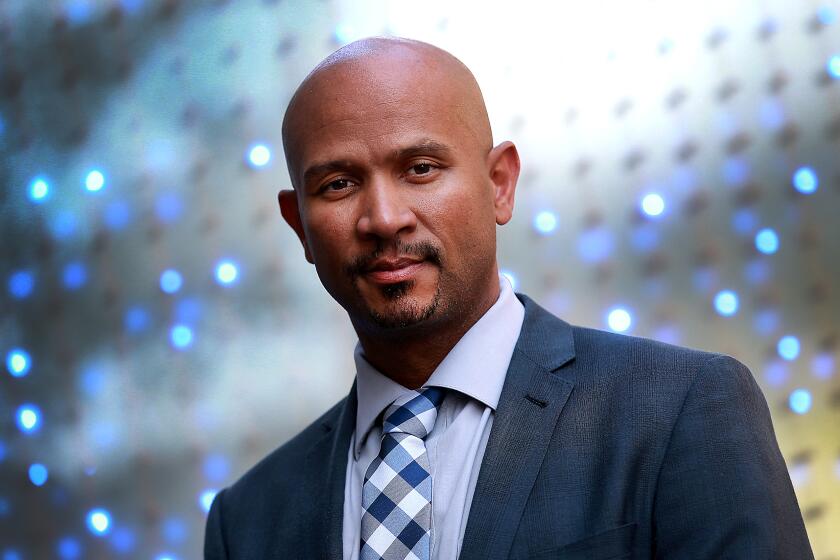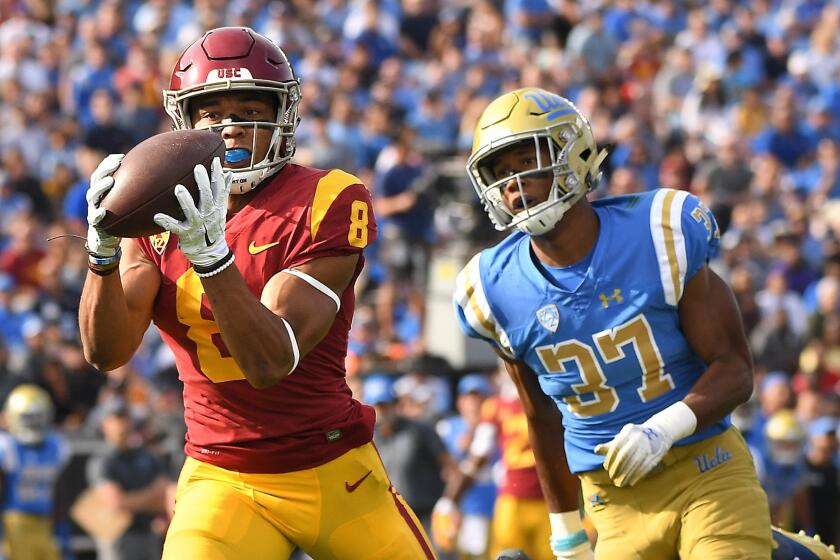Forget the NCAA: Startup basketball league to offer prep players pay, plus education
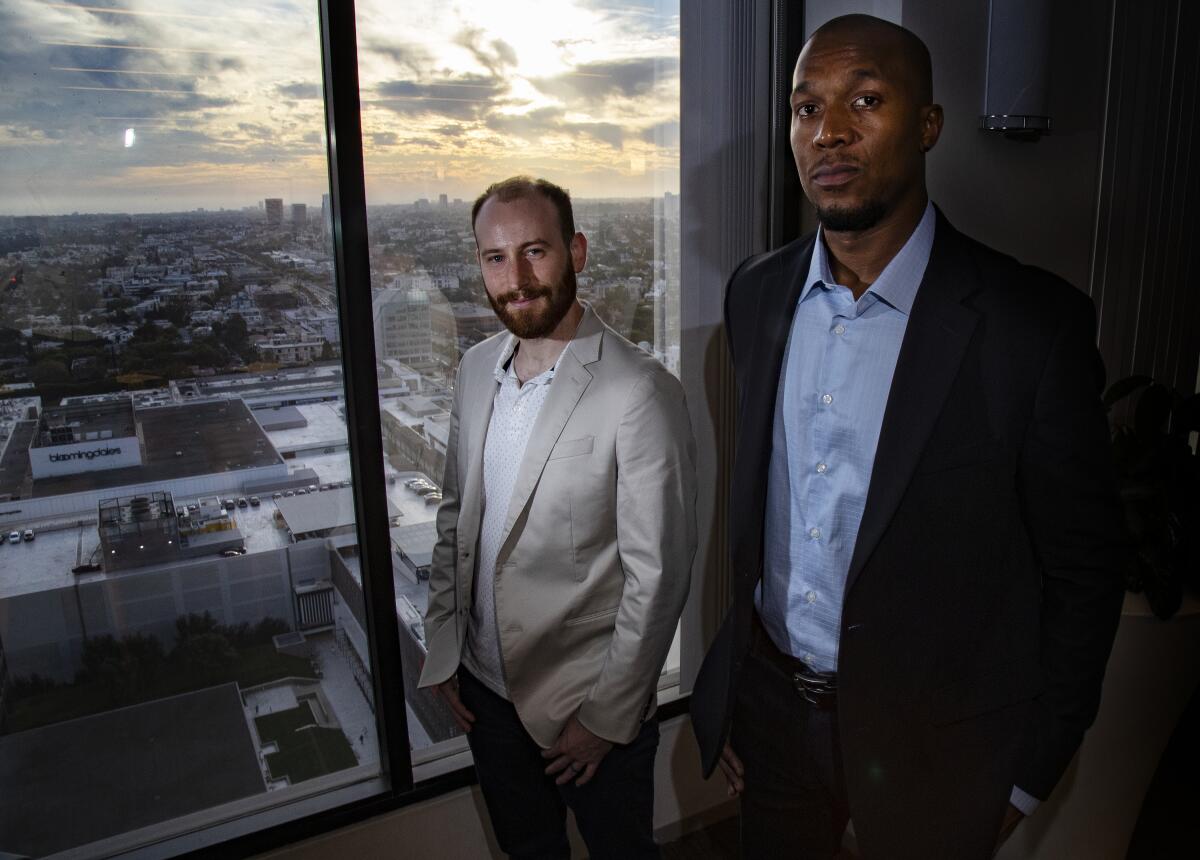
- Share via
The technology entrepreneur hears plenty of pitches. In his early days, Ameesh Paleja was the engineer behind Amazon Prime video. Then he helped get Kindle Fire off the ground. He knows how good ideas feel in their infancy, and now he has the resources to help bring them to life.
Paleja recently bought into a new venture, and it’s unlike anything he has touched: a college basketball league that would challenge the NCAA by offering salaries ranging from $50,000 to $150,000 to the top prep players nationally and internationally, while setting them up with a clear path to higher education.
The Historical Basketball League would be the first of its kind — the ultimate test of whether fans watch college basketball because of the emotional connection to the names on the front of the jerseys, because of the gifted players with the names on the back, or a mixture of both.
If there’s a window at all in the immense college basketball marketplace for the power of the individual player’s brand to thrive on its own, the founders of the HBL, now joined by Paleja and other prominent investors, believe they will be able to push through and blow it wide open.
“It’s a good confluence of tech, media, athletics and social investing,” Paleja says. “I don’t see that very often. And obviously the opportunity to disrupt a sitting monopoly is also very exciting.”
The HBL executive team — the actual people, not just their vision — was a selling point for Paleja, too. Chief Executive Ricky Volante is a Cleveland-based attorney who specializes in sports, entertainment and corporate law. Volante, a 30-year-old former college baseball player, took on the HBL as his personal mission nearly five years ago after meeting co-founder and sports economist Andy Schwarz. Volante absorbed Schwarz’s six-page manifesto on why making a college basketball league from scratch that provides the players “full citizenship” was the only way to topple NCAA amateurism.
“There might have been drinks involved,” Volante jokes.
Gov. Gavin Newsom has signed a high-profile bill that would allow college athletes to earn money, despite NCAA objections.
Volante and the Oakland-based Schwarz sought a face for the league that players could look at and see themselves. The day after 15-year NBA veteran David West retired from basketball last November, Volante was on the phone with the former four-year college standout at Xavier who was picked 18th in the 2003 NBA draft.
West jumped on board as the HBL’s chief operating officer and began to imagine a world in which he could recruit the top prospects in the nation to be a part of a game-changing experience.
“That got me going,” West says. “The college system doesn’t currently prepare guys for the professional level. This is why we’re going to see a great shift.”
The last year has been one seemingly never-ending pitch:
To investors like Paleja, a chance to be involved in a sports league and simultaneously affect social change.
To players and their families, the opportunity to professionalize at 18; receive a scholarship to a two-year or four-year college or vocational school that sits near one of the eight HBL cities (down the Eastern seaboard, Philadelphia, Baltimore, Washington, Richmond, Va., Norfolk, Va., Raleigh, N.C., Charlotte, N.C., and Atlanta); keep rights to their name, image and likeness for endorsement deals; and be trained in financial literacy and other practices that will help them navigate their careers in basketball or outside of it.
Mick Cronin’s wardrobe screamed Cincinnati instead of Westwood when he was hired by UCLA. A haberdasher helped Cronin improve his fashion game.
To coaches, the chance to teach the game and not be judged on wins and losses but player development on and off the court.
To media distribution outlets, fresh summer programming — the HBL would play its season between Memorial Day and Labor Day, allowing the players to focus more on academics during the traditional school year — and exclusivity to market a group of players who have built sizable social media followings before ever walking onto a college campus.
To colleges and universities, the rare chance to admit students who are largely from underserved communities yet have those students come to them with a full-paid scholarship from the HBL’s foundation, which also will provide tutoring and educational support.
It almost sounds too good to be true, and no matter who is hearing the pitch, questions persist. Volante, West and Schwarz have heard and addressed them all, again and again.
The most pressing: How will people watch? And, even once distribution is secured, will basketball fans tune in for Richmond against Raleigh in July simply because the players are college students and the basketball is elite, or do those kids need to be wearing Virginia Commonwealth or North Carolina State jerseys in February to draw interest?
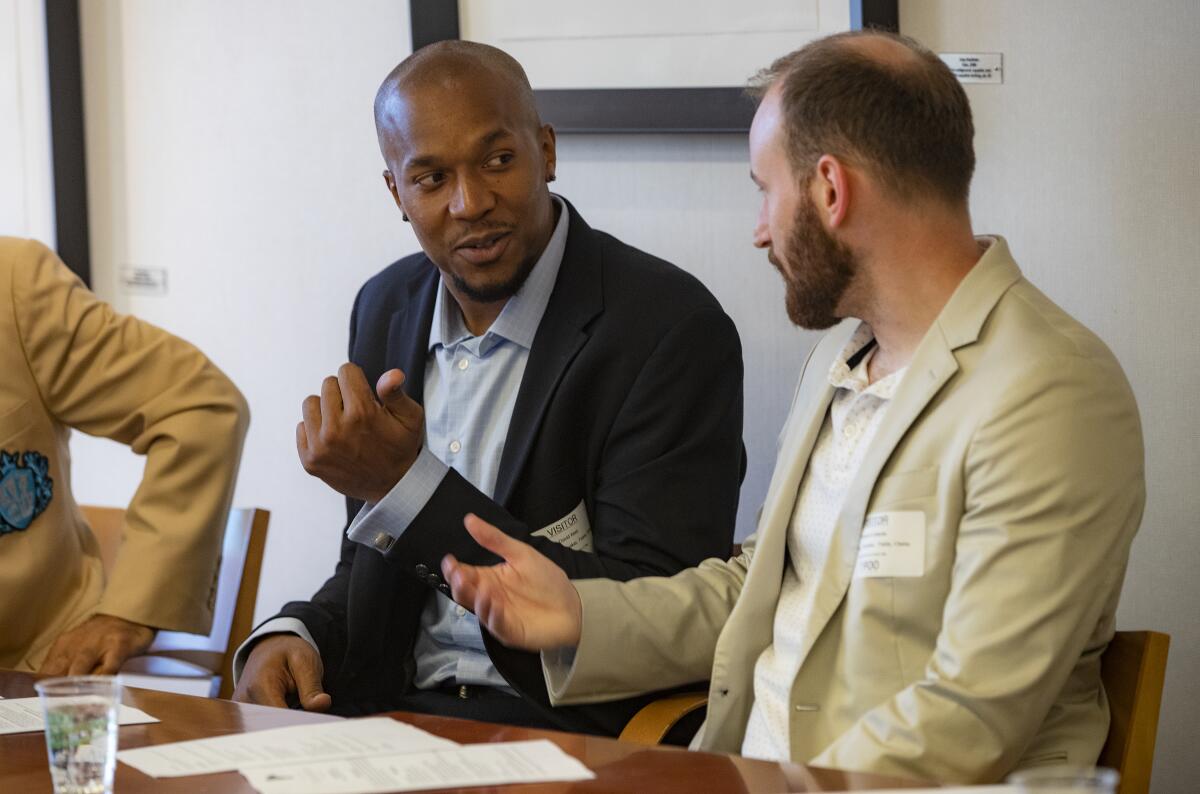
“I don’t think it’s one or the other,” Volante says, “And we’re going to put it to the test.”
The timing feels right, with public opinion swinging toward college players being able to have control of their Name, Image and Likeness rights in the aftermath of California Senate Bill 206 being signed into law in September, and with more future pros like 2019 recruits R.J. Hampton and LaMelo Ball electing to play professionally overseas in Australia instead of in the NCAA.
Still, the HBL already has had to delay its timeline for launch. It had announced June 2020 as the debut date, but Volante told The Times last week that it now plans to start playing games in June 2021.
The league needs distribution and a work force of players to fill out eight teams with a 12-man roster. A year from now, when the commitment list of the top 150 high school seniors in the nation is examined, the HBL will need to have scooped up pledges from at least a small percentage of them for the 2021 season. If not, then something will have gone wrong between now and then.
For HBL investors, this is no get-rich-quick scheme. Patience is needed.
“This is a big disruption,” Paleja says. “This is not like, ‘I’m in it for six months or 12 months and then I’m gone.’ That’s not what is going on here. We’re in it for the long haul, because it’s the right thing to do. If it was easy, it would have been done a long time ago.”
An evolving plan
As an economist, Schwarz jokes that he is “half-human.” So when he began studying the economics of amateurism a couple decades ago, he wasn’t approaching college sports’ issues with a bleeding heart.
That disposition would evolve over time as he watched feeble attempts at creating legislation to help college athletes flicked away with ease; litigation like the O’Bannon v. NCAA antitrust trial in 2014 leading only to a slightly higher limit for player compensation through a cost of attendance stipend; and the unionization attempt by the Northwestern football team being denied by the National Labor Relations Board in 2015.
“Who are the victims? Well, they’re predominantly African American men.”
— Andy Schwarz, Historical Basketball League co-founder and sports economist
“I felt like a wave had crested,” Schwarz says. “It was like, OK, unionization isn’t working, litigation isn’t working, at the time there was no way to get legislation passed. The only other way you can really break up a price-fixing wage cartel is with competition. You come and hire up the underpriced talent and use it to make money instead of the people who [have the monopoly].”
Schwarz started with a question: “Who in the cartel, among 354 schools that are essentially stealing money from athletes through collusion, which of them is getting the bad distribution of the ill-gotten gains?”
The answer was clear to him: Historically Black Colleges and Universities. Schwarz wondered if he could find a collection of HBCUs that would disband from the NCAA and house basketball programs made up of talented prospects from around the country who would be paid as employees by the league entity while going to school and promoting the brand of the HBCU.
“Who are the victims? Well, they’re predominantly African American men,” Schwarz says. “It seemed to be a great idea to talk to HBCUs, ask them why they were participating in a redistribution of wealth away from the very college students that they are designed to serve.”
Schwarz and Volante found that HBCUs were not willing to leave the NCAA. Then, they switched to a plan that would have the HBL use club sports on HBCU campuses as the home for their talent. That way, the players could represent the HBCU brand and the schools could still be a part of the NCAA with their varsity programs. Resistance remained.
Schwarz chose the Historical Basketball League name with this connection in mind. And, while the HBL will encourage its players to consider attending HBCUs based near the league’s cities, it will announce a new name for the league soon enough that better reflects its progressive vibe.
So much is in the works. Volante hopes to have announcements soon about a distribution partner and an apparel sponsor. Eventually, there will be decisions on team names for each city, locations of home arenas and the identities of head coaches.
When a UCLA football teammate was suspended for accepting food more than two decades ago, Ramogi Huma was mobilized into pushing for reform in college sports.
The HBL is comfortable with the new June 2021 start date because it wants to get it right the first time. Volante says his projections have the league’s annual operating cost at $20 million to $30 million, and his goal is to have two years of runway capital in the bank on the first day.
So, Volante and West never stop selling. Last week, they visited Los Angeles to court investors and stopped in for a meeting of AthletesTouch, an organization that brings together former college athletes to promote their success in the business world.
Listening to West, the 6-foot-9 two-time NBA All-Star,one would not have assumed he had an “X” tattoo for Xavier under his dress shirt and blazer.
“Sometimes when you’re on these campuses, you lose sight,” West says. “You get caught up in what’s going on in college, but then you realize, I literally got like 45 bucks.
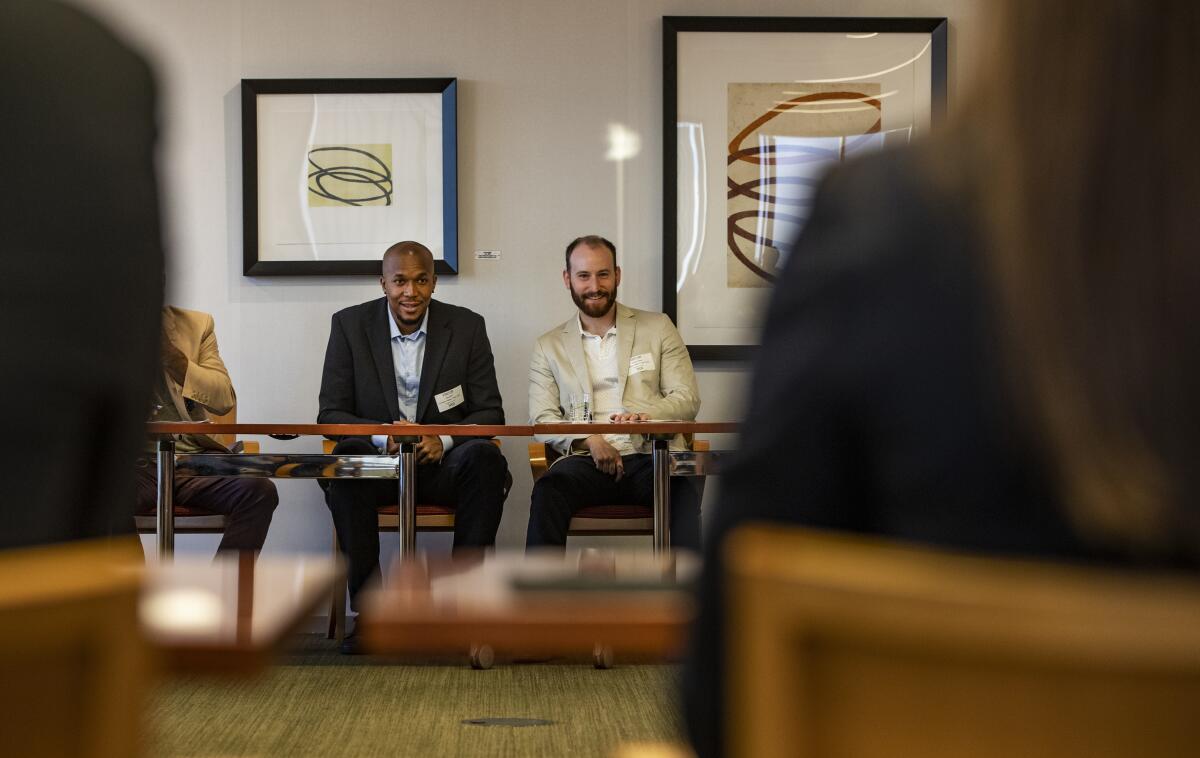
“Guys in the league get consumed by things that have nothing to do with basketball. Literally some of the highest-paid players in the history of the game, you’re making $20 [million], $30 million a year and Mom is handling your finances. I’m not exaggerating. And this is simply because in the 12, maybe 24 months you’re on a college campus, you’re being trained to be a college person. You’re not being prepared to take the next step. That’s it. And that’s what happens with us.”
Elite talent needed
That was David West in a room full of adults. Imagine him, with that blend of passion and perspective, in a family’s living room, knowing he has potentially a six-figure salary to offer simply as a starting point of a well-rounded benefit package.
No, he can’t offer the stage or the tradition for cultivating NBA superstars that North Carolina can, and that will matter to some people. But that didn’t stop Harold Little from reaching out to West last December while his son, Nassir, floundered as a freshman for the Tar Heels.
Little, a 6-foot-5 small forward, was a top-five recruit in the 2018 class who began his year in Chapel Hill as a projected NBA lottery pick. But Little could not crack Roy Williams’ starting lineup and averaged just 18 minutes per game. His draft stock dipped significantly, and he was picked with the 25th selection by the Portland Trail Blazers.
In the midst of that disappointment, Harold Little wanted to know if the HBL would be an option for Nassir for his sophomore season. West informed him he wasn’t sure if the league would be operating in time for Nassir, but the HBL’s message stuck with Harold.
“I’m looking at everything in hindsight,” Harold says, “so I’m looking at what did happen and thinking how maybe I would have done things differently. But, trying to be objective about it, I think I would seriously consider it, knowing the things I know and the experience we had. I would definitely consider doing something else other than the NCAA route, yes.”
In the next year, the HBL will need a handful of pioneering players to step out from the norm as Hampton and Ball did, but elect to stay in the U.S. instead of uprooting thousands of miles from home.
Asked if getting 15 of the top 150 players in the class of 2021 to choose the HBL would be a success, Schwarz went into fighting mode.
Some NCAA and college officials are predicting doom for sports programs in wake of new California law enabling athletes to receive payment for use of their name, image or likeness. They said similar things 50 years ago, about Title IX.
“You’re underestimating what we need to be successful,” Schwarz said. “That’s below our targets. Whatever our targets are, not everybody is going to be a lottery pick, but I don’t think we’re going to succeed with Division II talent. We need to be elite. We need to be the premier college basketball league, and we need to get there quickly.”
The HBL may not be able to take anyone from the class of 2020 as freshmen, but Schwarz expects they will pick up some of the players as transfers for 2021. Why enter the NCAA transfer portal to go through a similar experience at another school when one can transfer without penalty to the HBL, get paid to play and continue with his education?
The HBL would also be an option for players who declare for the draft and sign with an agent, foregoing their NCAA eligibility, but do not get drafted. Or players who make the NBA but flame out and want to begin or resume their college education.
West says the league will target the top 75 prep players in Canada as well as prospects from around the globe who would be a fit for the HBL format.
The league founders predict that players will come to the HBL through a variety of paths. But what if the NCAA, through pressure from SB 206 and similar legislation being put forth in other states, begins to allow players extra compensation for use of their name, image and likeness?
Volante says that some investors panicked when SB 206 was passed, fearing that it would lessen the HBL’s appeal.
“In terms of the negative side, it’s been perception versus reality,” Volante says. “The reality is we don’t think anybody’s trying to address the real problems, which is the outright compensation, the status of being a full-fledged student on a campus. To be a student-athlete, it means you give up certain rights at the door, and you don’t get the opportunity to bargain.”
Schwarz has seen enough the last 20 years to be skeptical of meaningful change from college sports’ governing body.
“What I think we’re going to see [from the NCAA] is, ‘Aren’t we wonderful to grant you the limited use of something that ought to be your right?’ ” Schwarz says.
“If I could summarize the difference, if an athlete gets an offer and they ask us, ‘Do you think this is a good offer?’ the only way we would say no is if they’re getting paid too little. And the exact opposite is going to happen with the NCAA. They’ll have a committee to vet the agreements to make sure the athletes don’t get paid too much.”
More to Read
Go beyond the scoreboard
Get the latest on L.A.'s teams in the daily Sports Report newsletter.
You may occasionally receive promotional content from the Los Angeles Times.

